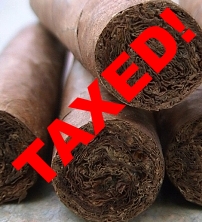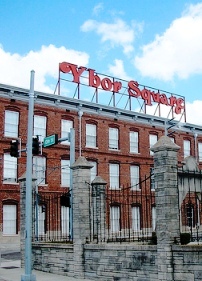Stogie News: FDA Tobacco Committee Faces Ethics Questions
10 Jun 2010
The Food and Drug Administration (FDA) Advisory Committee created to give recommendations about FDA regulation of tobacco, including cigars, is under fire for multiple conflicts of interest among some of its members.
 Citizens for Responsibility and Ethics in Washington (CREW), a watchdog group, sent a letter earlier this week to the inspector general of the Dept. of Health and Human Services asking for an investigation into appointments made by the FDA to the Tobacco Products Scientific Advisory Committee (TPSAC).
Citizens for Responsibility and Ethics in Washington (CREW), a watchdog group, sent a letter earlier this week to the inspector general of the Dept. of Health and Human Services asking for an investigation into appointments made by the FDA to the Tobacco Products Scientific Advisory Committee (TPSAC).
TPSAC was created under the Family Smoking Prevention and Tobacco Control Act which puts tobacco products under FDA oversight. Last Fall the FDA sought comments on expanding its authority to include cigars. A recommendation by the TPSAC would be the likely first step towards regulation of cigars, which would be extremely damaging for the cigar industry and the choices of cigar smokers.
In its letter to the inspector general, CREW raised issues about Drs. Neal Benowitz and Jack Henningfield, two members of the committee who have financial conflicts of interest based on their ties to pharmaceutical companies that make smoking cessation products. Both have also made substantial money as expert witnesses in cases against the tobacco companies who they are now charged with regulating.
CREW Executive Director Melanie Sloan noted, “TPSAC panel members are barred from having financial ties to cigarette companies. Common sense dictates they shouldn’t have ties to pharmaceutical companies that make smoking cessation products either.”
In a statement to the New York Times, an FDA spokesman responded to the charges by noting “tobacco cessation drugs are not regulated by the Center for Tobacco Products.†But that doesn’t address the conflict raised due to Benowitz and Henningfield’s financial interest in getting smokers to quit smoking and use the products they stand to profit from.
In addition, the doctors conflict of interest suggests that both are in violation of President Obama’s highly-touted ethics policy, signed immediately after he took office. That policy bars “every appointee in every executive agency” from participating in “any particular matter involving specific parties that is directly and substantially related to [the appointees’] former employer or former clients, including regulations and contracts.”
The FDA ethics office did not respond to multiple questions from StogieGuys.com about whether the apparent conflicts of interest constitute a violation of the Obama executive order on appointees’ ethics commitments.
photo credit: FDA

 Revolution Cigars is the maker of 262 Paradigm, a blend that honors the date (February 1962) that JFK hypocritically bought a shitload of his favorite Cuban cigars before signing a trade embargo against the communist isle. “Now you can smoke the legacy with 262 Cigars, post-revolution seed with pre-revolution flavor,†says Revolution’s website.
Revolution Cigars is the maker of 262 Paradigm, a blend that honors the date (February 1962) that JFK hypocritically bought a shitload of his favorite Cuban cigars before signing a trade embargo against the communist isle. “Now you can smoke the legacy with 262 Cigars, post-revolution seed with pre-revolution flavor,†says Revolution’s website.
 It’s not a huge cut—41.11% to 33.02%, to be exact. And, since its paid by distributors, the reduction may not even be noticeable by the time the retail price is set. But, hey, in this economy anything helps, right? Of course, it’s hard not to wonder why: Why would the state cut cigar smokers and users of tobacco products other than cigarettes a break?
It’s not a huge cut—41.11% to 33.02%, to be exact. And, since its paid by distributors, the reduction may not even be noticeable by the time the retail price is set. But, hey, in this economy anything helps, right? Of course, it’s hard not to wonder why: Why would the state cut cigar smokers and users of tobacco products other than cigarettes a break? This particular Padilla Series ’68 Robusto had been in my humidor since fall 2007. I didn’t really know what to expect. I’d enjoyed a few of these more or less fresh and was hoping it would be at least as good. What I got was much better.
This particular Padilla Series ’68 Robusto had been in my humidor since fall 2007. I didn’t really know what to expect. I’d enjoyed a few of these more or less fresh and was hoping it would be at least as good. What I got was much better.

 1) The Church of Scientology paid about $7 million to buy what was once the world’s largest cigar factory, built in 1886 by the man who founded Tampa’s Ybor City. The three-building complex has housed offices since the 1970s. Scientologists propose using the buildings for offices, gatherings, and Sunday service. Although the church says that it plans to honor the building’s historical significance in its plans, the move is not without controversy. “Some business and civic leaders in Ybor City worry about the potential loss of property tax revenues due to the church’s tax-exempt status and the potential denial of alcohol licenses to future businesses opening within 1,000 feet of the church’s property,†writes the
1) The Church of Scientology paid about $7 million to buy what was once the world’s largest cigar factory, built in 1886 by the man who founded Tampa’s Ybor City. The three-building complex has housed offices since the 1970s. Scientologists propose using the buildings for offices, gatherings, and Sunday service. Although the church says that it plans to honor the building’s historical significance in its plans, the move is not without controversy. “Some business and civic leaders in Ybor City worry about the potential loss of property tax revenues due to the church’s tax-exempt status and the potential denial of alcohol licenses to future businesses opening within 1,000 feet of the church’s property,†writes the  Patrick Ashby
Co-Founder & Editor in Chief
Patrick Ashby
Co-Founder & Editor in Chief Patrick Semmens
Co-Founder & Publisher
Patrick Semmens
Co-Founder & Publisher George Edmonson
Tampa Bureau Chief
George Edmonson
Tampa Bureau Chief